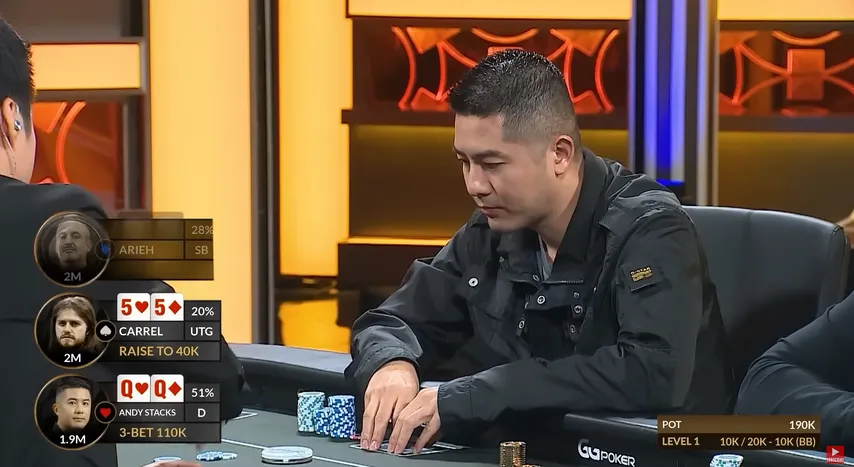In this GGPoker Game of Gold hand, Jonathan Little analyzes a hand between Charlie Carrel and Andy Stacks. With an open shirt and a direct connection to the poker gods, Charlie (and the runout) put Andy in a very tough spot.
Let's see what Jonathan Little thinks about the play from both contestants.
Jonathan – In this hand, we are playing 2 million chips deep at 10,000/20,000, so we're playing about 100 big blinds deep in the spot.
Charlie Carrel, under the gun, we are playing short-handed. He raises it to 40,000 with , which is perfectly fine and reasonable. Over to Andy Stacks on the button, he makes it 110,000 with . Both players have a and .
Around to Josh Arieh in the small blind with . I think the standard play in this scenario is just to fold, but if you do think Charlie is opening a little bit too wide and you think Andy Stacks is 3-betting a little bit too wide, then you know, , , , those types of hands are okay to 4-bet bluff with. If you did want to 4-bet bluff in the spot, you'd want to make it pretty big, something like 400,000, 380,000, something like that. And then if you get shoved on, you'll just fold. Essentially, you're taking those big offsuit hands and using their big cards as blockers. He lets it go.

Back around to Charlie. Getting okay pot odds with a small pair, you must call, you must see a flop and spin the wheel.
Let's see what the flop brings.
The Flop
The flop comes . Charlie Carrol has a pair and a straight draw. Andy Stacks has no pair. Charlie, to my surprise, goes for a tiny lead, 30,000 into 260,000.
Now, in general, you do not want to be leading too often into the pre-flop 3-bettor, because they're going to have a whole lot of overpairs in their range and a whole lot of decent flush draws. That said, I know Charlie gets out of line and plays exploitative poker where he thinks it makes sense. So when does it make sense to lead exploitatively here? Well, if you think your opponent will ever fold anything to a 30,000 bet into the 260k pot, leading is pretty nice. If he does fold out , that's an okay success because Andy would have some amount of equity with those hands, and he may end up bluffing the flop and maybe the turn and forcing you off the . So if you can just get those hands to fold the pot immediately and just give you the pot, that's incredible.
Also, if you're not going to get raised very often, leading becomes very viable with a lot of medium strength hands, because when you lead tiny, you're going to extract value from those random overcards, and if you are against a hand like , if that will not raise, then you just get to see the turn very, very cheaply, which is good, because we're behind but we have some equity. So if you think your opponent's going to fold too often to the lead, leading becomes okay. If you think they are going to raise too infrequently, leading becomes okay.
Charlie goes for the lead, 30k.

Andy gives it some thought and just calls. And I think this is probably a bit of a mistake, because the bet is so incredibly tiny. When you're facing a very, very, very tiny bet, it's almost like your opponent checked. So the question then becomes, would we check it back on the board if checked to? And I would think, obviously not, right? Our hand is almost always good, but somewhat vulnerable to being outdrawn in general. So I think we definitely want to put in a bet in this scenario, and if I were in his shoes, I would have made it something like 220k, a pretty chunky raise.
And yeah, it's bad when you're against a set, but there really aren't that many combinations of sets, only nine, right? And Charlie could very easily have a flush draw, which would make a lot of sense, a hand like suited, right? There are four of those. And also perhaps some medium strength made hands like , and maybe just some sporadic bluffs like .

Again, I don't know what Charlie's leading range actually looks like in this spot. It probably is way more specific than a range of very good made hands, marginal made hands, and draws. It's probably one of those three categories primarily. But in general, when you're facing a tiny, tiny bet, especially a tiny lead, you probably, well, I can tell you, you need to raise more often than you may naturally think you should. And you especially want to be raising with hands that are almost always good but vulnerable, like .
Whatever, Andy calls. Let's head to the turn.
The Turn
The turn is a disaster for Andy Stacks. It is the .
Charlie, with his straight, is in a wonderful spot in this exact hand. However, he has to realize he will be against some flushes some portion of the time, and when he is, he is going to be in terrible shape. However, I think the right play in this spot is just to bet as if your opponent has an overpair or a random overcard that is a . So I think going for something like half-ish pot or 2/3 pot is perfectly fine and reasonable. And that's exactly what Charlie does, targeting those types of hands.

Now, you may say, shouldn't he check to put in a check-raise? Absolutely not. This is a spot on the turn where Andy Stacks is going to check back a lot of hands like , for example, because he realizes Charlie could have sets or flushes or straights, right? So I think betting in Charlie's shoes is the only play that makes sense.
Over to Andy with the overpair and the Queen-high flush draw. He has an easy call at this point. He certainly doesn't love it, but if it goes check-check on the river, he's going to win some portion of the time. And, if he improves to a flush, he's going to win a lot of the time. So even though he's also in a relatively dicey situation, this is a pretty easy call.

The River
The river is the wild . At this point, Charlie has to figure out, does Andy have all that many flushes in his range, and does he have all that many Nines in his range?
So let's talk about flushes first. Most people on the flop would probably raise with a flush draw when facing that tiny bet, just in general. I think a lot of people recognize high equity draws don't mind raising. So if most of Andy's flush draws are going to raise the flop, or potentially on the turn when he gets there and faces a bet, then Charlie can start to remove flushes from Andy's range, which is great.

Next, will he have all that many Nines for the top end of the straight? Well, he could have , that would make a whole lot of sense. And he could have maybe a little bit of suited, suited, suited. But you have to presume those are going to fold the turn unless they have a flush. So Charlie's really only worried about , six combinations, not all that many.
So if Charlie can remove lots of flushes from Andy's range, and most of the from Andy's range, then Charlie has a pretty reasonable spot to bluff, especially since Charlie could easily have a flush. And you know, he could be leading with a hand like suited on the flop for all I know, and then continue bluffing it. And also, Charlie could also just have some flushes.
So this is a spot where I think Charlie presumes he has a pretty big nut advantage in general, because he can have the flushes and the straights, and Andy probably does not. When that's the case, betting makes a whole lot of sense. And typically, you want to bet pretty large. And that's exactly what Charlie does. He goes for a pot-sized bet.
Let's see how Andy proceeds.
Editor's note – Behind the scenes, Fedor says that Andy could shove over this bet from Charlie, to which Yoh Viral says, "If he shoves, I quit poker".

Andy's Decision
After much deliberation, Andy does not raise, he does not call, he lets it go. And look, in terms of who is right between Yoh Viral and Fedor, I think that Andy seems to be a little bit more on the tight/aggressive side in general. And I don't think most tight-aggressive players are going to take the and turn it into a bluff, because they're going to be very concerned that Charlie could just be sitting here with a flush that will not fold.
Now, you also have to ask, does Andy think that he has a whole lot of Ace-high flushes in his range, King-high flushes, and Queen-high flushes? And maybe he does, maybe he doesn't, right? Andy knows his strategy better than I know Andy's strategy, or you know Andy's strategy. But if Andy knows that he just doesn't have a whole lot of flushes here, he really doesn't want to do a whole lot of bluffing in this scenario.

So in terms of hands that want to start bluffing first, it's going to be the Ace of Hearts. And certainly, Andy will have some of those. And then next, the , and he's going to have some of those. So all that considered, I don't really think Andy's going to be jamming this pretty much on the river.
So while I often err towards agreeing with Fedor, in this spot, I definitely agree with Yoh Viral. I think this is a spot where Andy was either going to call or fold. Now, he did fold. How do we feel about folding? I don't like it. I know that Charlie's capable of bluffing. This is certainly a spot where, like I said, Charlie will have some flushes and he will have some , but he's also going to have a whole lot of hands like sets, two pairs, random bluffs. And all of those are going to at least feel somewhat inclined to bluff the river when he can remove a lot of the very strong hands from Andy's range. So when that's the case, I'm usually just going to find the call here and lose some portion of the time.
That said, Andy folded, he conserved the stack, and he continued grinding it out.
















